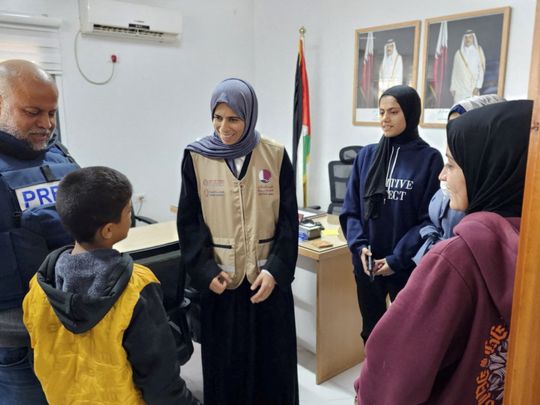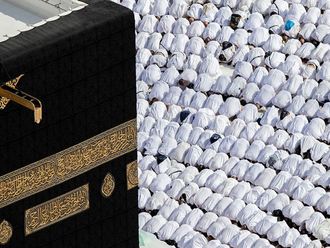
JERUSALEM: The deal seemed on the verge of unraveling. Hamas had accused Israel of failing to keep its side of the bargain and Israel was threatening to resume its lethal onslaught on the Gaza Strip.
That was the point at which a Qatari jet landed at Israel’s Ben-Gurion International Airport on Saturday. Negotiators aboard set to work, seeking to save the ceasefire deal between Israel and Gaza’s Hamas rulers before it fell apart and scuttled weeks of high-stakes diplomatic wrangling.
The first public visit by Qatari officials to Israel marked an extraordinary moment for the two countries, which have no official diplomatic relations.
“This is something we’ve never seen before,” Yoel Guzansky, a senior fellow at the Institute for National Security Studies in Tel Aviv, said of the Qataris’ stay in Israel.
“It’s the only external actor in the world with that much leverage on Hamas, because of its many years of support.”
The weekend mission was successful, and most of the team jetted home. But several Qatari mediators stayed behind to work with Israeli intelligence officials on extending the four-day truce, which ends on Tuesday morning, according to a diplomat briefed on the visit who spoke on condition of anonymity because of the sensitivity.
US, Egypt involved
With its close ties to the United States — it hosts the largest American military base between Europe and Japan — its communication with Israel since 1995 and its support of blockaded Gaza to the tune of what estimates suggest is more than $1 billion since 2014, Qatar is uniquely positioned to break deadlocks in the ceasefire talks, which also involve the US and Egypt.
The country has hosted an overseas Hamas political office since 2012, allowing Qatar to wield some influence over the militant group’s decision-makers. Top Hamas officials, including the group’s supreme leader, Esmail Haniyeh, live in Qatar.
Qatar says Hamas’ political office in its capital, Doha, came about at the request of US officials who wanted to establish a communication channel, just as Doha had hosted Taliban offices during America’s 20-year war in Afghanistan.
Qatari officials say they are guided by a desire to reduce conflict, though their ties with a range of Islamist groups, including Hamas, the Muslim Brotherhood in Egypt and the Taliban have drawn criticism.
“This is soft power on steroids, mobilised for America’s interest,” said Patrick Theros, a former US ambassador to Qatar. “Hosting organisations which the United States cannot be seen talking to is part of this policy.”
In the Israel-Hamas hostage negotiations, Qatari mediators, joined by those from Egypt and the US, faced the task of getting the warring sides to put faith in diplomacy when trust was sub-zero.
Meetings with Mossad
Over the weekend, Hamas complained that Israel had violated the terms of their ceasefire and said the deal was in danger. Only 137 trucks with badly needed humanitarian aid made it through on Friday, the first day of the truce, and 187 on the second day, according to the UN Palestinian refugee agency. Israel had promised to permit 200 a day.
Qatari officials resorted to face‐to‐face meetings with Israeli officials to try to save the deal, according to the diplomat. A few hours with Mossad officials in Tel Aviv proved crucial on Saturday. Suddenly, the deal was back on. Hamas handed over its second batch of Israeli hostages, families in the West Bank rejoiced over another 39 women and teenagers freed from prison, and Palestinians in Gaza emerged from their shelters to search for fuel and missing family members.
Qatar’s minister of state for international cooperation, Lolwah Al Khater, became the first foreign official to visit the besieged Gaza Strip on Sunday.
She used the pause in fighting to survey the disputed influx of aid, meet wounded Palestinians and talk with Wael Al Dahdouh, Gaza bureau chief of Qatari-funded Al Jazeera, who lost his wife, son and grandchild in an Israeli airstrike. The pan-Arab broadcaster, which has more cameras in Gaza than any other news outlet, has dominated Arabic coverage of the war.
Despite their differences, both Israel and Hamas have an interest in prolonging calm. Even as bigger questions mount over what happens after the war, a Qatari official who spoke on condition of anonymity because of the sensitivity of ongoing negotiations says his country stays focused on what’s immediately possible, such as maintaining the ceasefire and preventing a regional war that draws in Hamas’ Iranian patrons or Lebanon’s Hezbollah militants.
A steady stream of officials have passed through Doha to that end, including Iran’s foreign minister, Lebanon’s caretaker prime minister and the director of the CIA.
“There is no conflict that began and ended on the battlefield,” Majed Al Ansari, spokesperson for Qatar’s Foreign Ministry, told The Associated Press on Monday. “Now, as hostages are being released and there are pauses in the fighting, we might be able to find a solution.”











